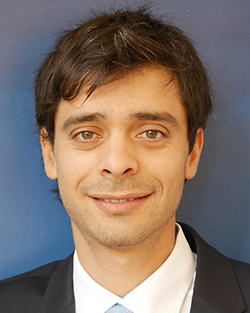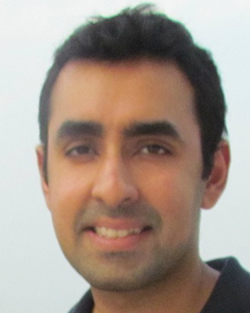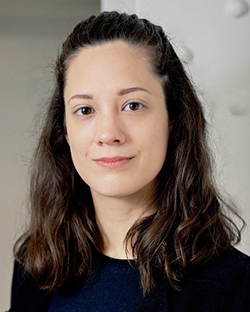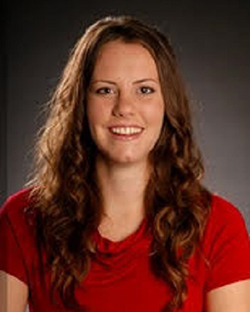The first cohort of Canada-UK Fellows have entered the second year of the programme, in which they bid for funding toward projects or experiences to facilitate their career independence. Funding has been awarded to support novel research projects, research commercialisation and a policy secondment.
|
Matias Acosta Matias Acosta has vast experience in materials/devices for the 4th industrial revolution like sensors for IoT and fuel cells to transform hydrogen to clean electricity. He has worked as a scientist at the University of Cambridge and the Technical University of Darmstadt. He has also been a consultant and has transferred his work to major corporations and startups. Throughout his career, Matias has published more than 30 peer-reviewed articles which have been cited more than 1,700 times. His academic achievements have been recognized with more than 10 international awards. Matias has also worked actively at the interface between science, policy and diplomacy. He was president of Trinity College Postdoctoral Society, policy representative of associates at the University of Cambridge, a committee member of Cambridge Science and Policy Exchange, and curator of the Global Shapers Cambridge Hub. He was the founding committee of the Association of Argentinian Scientists in the UK and founding coordinator of Empowering UK-ARG to promote scientific cooperation and mobility of entrepreneurs. He is the founder and executive director of Shaping Horizons, a high-level summit & action programme to discuss challenges and ignite local projects jointly between the UK and Latin America for sustainability. Currently, Matias is the Head of Exploration in the United Nations Accelerator Lab in Buenos Aires, Argentina. Matias' passion is to build disciplinary, geographical and generational bridges for an inclusive and sustainable future.
|
|
|
Saif Ahmad I obtained my PhD from the University of Cambridge, where based in the MRC Cancer Unit, I studied the intersection of DNA repair processes and cell-cycle control. Now I am a post-doctoral researcher based at the Cancer Research UK Cambridge Institute, studying how breast cancers develop resistance to radiotherapy. As part of this, I am collaborating with AstraZeneca to define novel drug-radiotherapy combinations aimed at overcoming treatment resistance. I also practice as a cancer clinician within the National Health Service. The understanding of science within the wider public is important to me. As an Assistant Editor of the Royal College of Radiologists’ Clinical Oncology journal, I lead the development of podcasts to increase accessibility to scientific and health research. My own research has also featured on BBC News online and in The New York Times. This Fellowship has been a fantastic opportunity for me to develop my skills in innovation, policy and entrepreneurship and this has enabled me to be more effective in both my clinical and academic endeavours. Engaging with all of the Postdoctoral Fellows has been an incredible and inspiring experience. Being involved in our Global Challenge project, which involved acquiring air pollution data through a citizen science project in Argentina, and engaging with local government and academic stakeholders was a fantastic learning experience. I have also been able to engage with like-minded researchers at Princess Margaret Cancer Centre in Toronto. Moreover, the Fellowship allowed me to meet fellow postdoc Nicole Weckman who has expertise in developing biosensors and together we have been working on an exciting start-up venture - NeutroCheck - which is developing a novel medical device to improve the care of cancer patients on chemotherapy.
|
|
|
Karina Vold I am a postdoctoral research associate at the Leverhulme Centre for the Future of Intelligence and the Faculty of Philosophy at the University of Cambridge, as well as a Digital Charter Fellow at the the Alan Turing Institute. I received my Ph.D. in philosophy from McGill University, where my dissertation focused on metaphysical issues in philosophy of mind and cognitive science. My current research focuses on how artificial intelligence systems can be designed to support and enhance human cognitive capabilities. My work has been recognised and supported by multiple international grants and awards, and covered by media outlets such as the British Broadcasting Corporation, the Canadian Broadcasting Corporation, and Channel News Asia, among others. I have also been a visiting scholar at multiple international institutions, most recently at Ruhr University, Duke University, and the Australian National University, as well as a lecturer at Carleton and McGill Universities. In 2020 I will begin as an Assistant Professor in Philosophy, Humanities, and Technology at Carleton College, in Minneapolis. As a CanadaUK Fellow, my objective was to build partnerships between British and Canadian institutions working on AI ethics including between government, business, and academic institutions. This work helped teach me how to successfully engage with government and industries, and I have since used this knowledge to both feed into governmental reports and to consult with AI companies.
|
|
|
Nicole Weckman I hold a PhD in Engineering from the University of Cambridge (2018) where I researched the design of microelectromechanical systems to be used as environmental and biosensors. I have previously studied Chemical Engineering at McGill University (MEng (thesis), 2013) and Nanotechnology Engineering at the University of Waterloo (BASc, 2011). My current research focuses on the development of nanopore sensors for use as biosensors, with a particular emphasis on the translation of my research to real world medical diagnostic applications. I believe that diverse mindsets are critical to solving the global science and engineering challenges society faces. Motivated by this I sat on the management committee to organize Shaping Horizons, a high-level summit & action programme to discuss global challenges and ignite collaborative sustainability projects between the UK and Latin America. I am also actively committed to discussing my research with the broader community and promoting greater diversity in students pursuing STEM careers, particularly in the engineering field. Supported by the Canada UK Fellowship I have worked with the Government of Argentina and open-seneca on an air quality sensing project to drive environmental policy. This has built my experience in managing multi-stakeholder public policy and citizen science impact projects. Through the Canada UK Fellowship I have also built entrepreneurship skills and become involved in the start-up company, NeutroCheck, which is developing a medical device to improve the care and quality of life of chemotherapy patients. In the second year of the Canada UK Fellowship, I will be using my independent time to research the development of nanopore sensors for diagnosing tuberculosis in vulnerable communities in Canada and around the world. This will take advantage of the networks and the entrepreneurship training that I have gained during the first year of the Fellowship programme. It will also enable me to further build my project management skills by leading my own independent research project.
|




